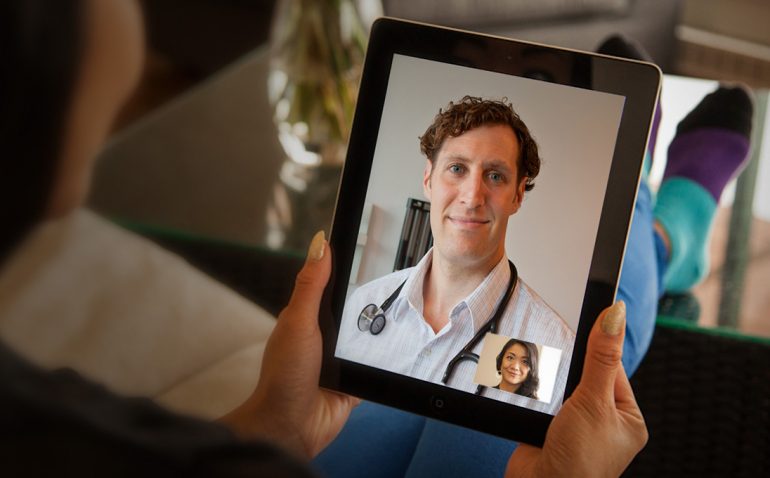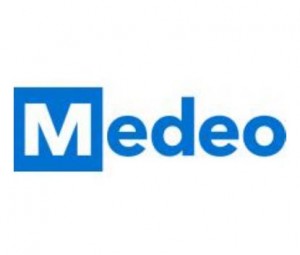I’ve seen the future of healthcare: it’s my doctor’s presence on the screen in front of me.
From the comfort of my home, it’s launching a web browser, making sure the webcam and microphone is working and discussing treatment options for my hip injury. By using Medeo’s platform, I’m also getting a referral to a sports medicine specialist, and even having a prescription refilled.
No more waiting rooms full of sick people, no more waiting until 3:00 for a 2:00 appointment and no more having to browse through four-year-old issues of Better Homemaking. This is telemedicine, and in BC the future of healthcare is now.
This Vancouver-based startup currently has 2300 users who say that their family doctor is on Medeo. In November the platform added 1500 new patients. They have more than 200 doctors and operate 81 hours/week (Mon-Fri 7am-10pm, Sat 9am-3pm).
Medeo offers a personal experience that’s no different than visiting your doctors office, as you’re greeted by a member of their virtual reception team. For CEO Ryan Wilson, the human connection is still at the core of healthcare, and he was quick to suggest that “we’re not suffering from premature automation.”
“Having the human touch at the centre of our development process has allowed the Medeo team to learn more, learn faster, and make the platform a more engaging experience for patient and doctor alike,” he said.
There’s no question that our healthcare system is full of inefficiencies. We’ve all probably bemoaned the fact about never getting those two hours of our lives back, having to see a doctor just to get a prescription renewed. Wilson offers “I don’t think there’s anything broken between the doctor/patient relationship, between having the conversation about what’s ailing someone, the potential treatment and the steps to feeling better. It’s the modality of communication where there’s room for improvment. Sometimes you need to be face to face, and other times you don’t.”
Right now Medeo is focusing on the patient seeing the doctor online. Secure video conferencing is just a small part of what they’re trying to accomplish. Creating and deploying a better than financial system grade security and privacy measures has been a key to winning over the BC Ministry of Health and the BCMA, and thus doctors, patients, pharmacies, labs and x-ray clinics.
The biggest challenge for Medeo was not just building the platform, but actually getting doctors paid. With no billing, there’s no physician buy in. Wilson acknowledged “it was the forward thinking attitudes of the BC Ministry of Health and the BC Medical Associations joint committees dealing with the fee codes that had the foresight to see this coming, and make the changes.”
Medeo also gives patients access to their records. It’s empowering them to play a much greater role in their healthcare. It’s providing all of the clinicians involved in the circle of care with relevant, up-to-date information on their medical history, allowing them to better collaborate.
“The whole paradigm around them is wrong,” Wilson said of electronic health records. “It’s not about the record, it’s about the need for collaboration and workflow automation, and record keeping is just a by-product of doing those two things really well. How many businesses or people still use fax machines today? It’s ridiculous that our health information is getting faxed between people and institutions. What important information is slipping between the cracks?”
He said the company isn’t trying to build a better EMR. Rather, “we’re going back to the fundamental principles of care and building up a new system of electronic collaboration tool for the circle of care. An integrated approach to healthcare is shown to deliver better outcomes more cost effectively, with happy patients.”
Hospital readmissions cost our healthcare system about $1.8 billion per year. The billions in cost is brutal, but the negative impact on the patients and their families is worse. Wilson questioned, “by enabling better communication between the patient and those within the circle of care, what kind of impact can we have on reducing hospital readmissions?”
In-home telehealth presents an opportunity to address this issue. This can deliver more cost effective care and better patient outcomes, and he thinks billions will be saved. “It’s like creating a renaissance of primary care using technology, and having the opportunity to be at the centre of it.”
Every Province has telehealth fee codes, and the difference is found in the fine print that usually bounds the interaction between doctor and patient, within the confines of a provincial health related or health authority facility. BC simply makes things location and network-agnostic, and they’re currently in discussions with physician groups and healthcare stakeholders in Alberta and Ontario. Thus if it can work in BC, it’s only bureaucratic self-interest that will hold up Medeo’s goal of being a Canada wide healthcare platform.



